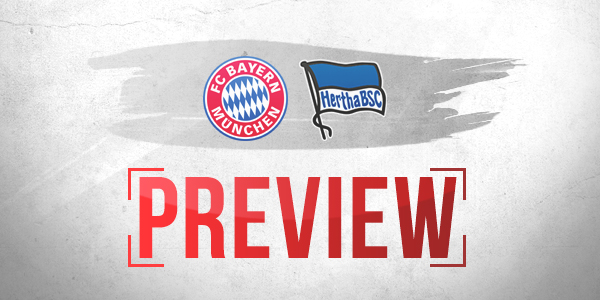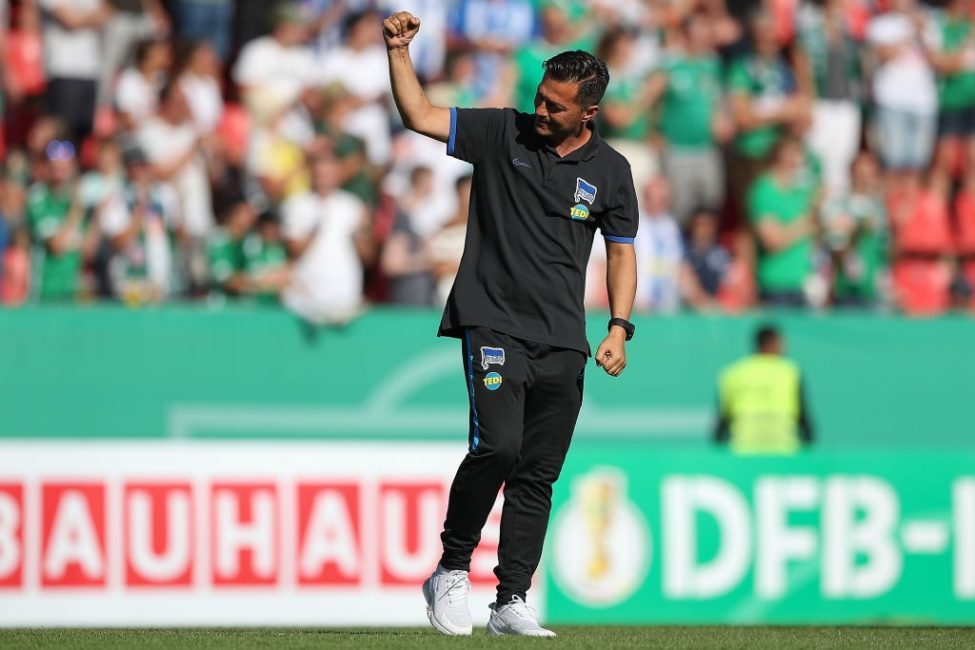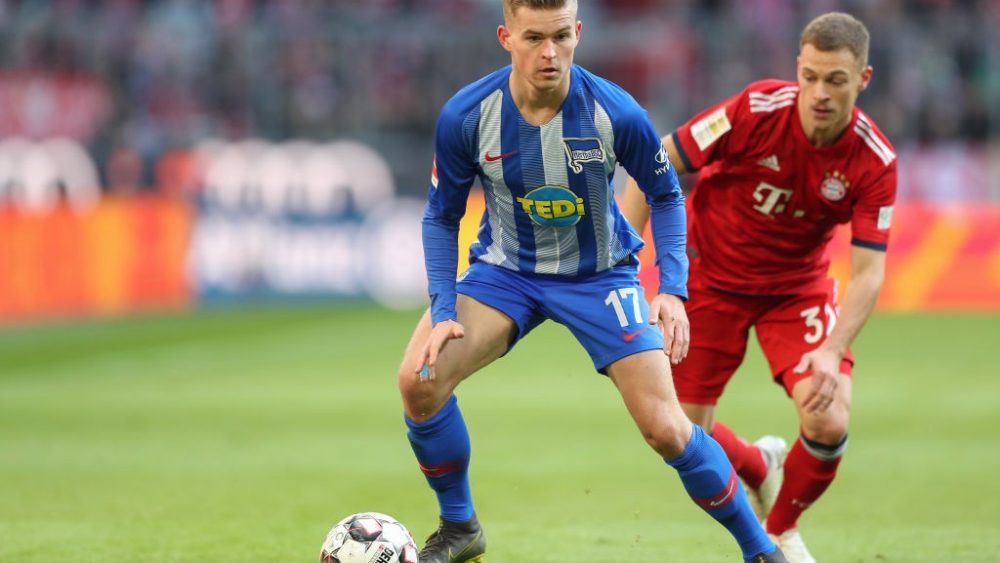Bundesliga MD 01 Preview: Bayern against Hertha
Friday night’s season opener of Bayern Munich against Hertha Berlin will mark the 18th edition of the Friday night season opener in the Bundesliga. Bayern has taken part in this eleven times, resulting in ten victories and one draw against HSV in 2008 (2-2). For Hertha, the match on Friday is just the second time that they have participated in this fixture. Their first match in 2002 against Dortmund ended in a 2-2 draw.
So neither of the two teams have been beaten in this special fixture, although the sample size for Bayern is considerably larger. The home record favours Bayern too: 27 wins, 5 draws, and 4 defeats. The last time Hertha won away in Munich was in 2001 in the league cup (0-1). The last time this happened in a regular Bundesliga match was in 1977 (0-2). Since then, Bayern has won 19 times and drawn 5 times against Hertha at home.
Hence, on paper Bayern are the clear favourites, as they so often are. But the “grand dame” of Berlin started a process of transformation earlier this summer. Under new coach Ante Čović, and with the help of a big investor, the unattractive club from the capital tries to turn itself into a “Big City Club”.

Hertha BCC: The Big City Club?
Hertha BSC has sold 37.5% of its shares to investor Lars Windhorst and his investment company for €125 million. Windhorst has an option to buy another 12.4% stake (49.9% in total) at a higher price per share later, which would increase the total value of the investment to an estimated €250 million. The investor’s ambitions seem huge, but not everyone in Berlin looks forward to the new situation.
Hertha expert and Hertha Base author Marc Schwitzky said in an interview to German news channel n-tv that he was worried that the new investor’s ambitions might be unrealistically high. Despite all the sudden millions, Hertha would be foolish to believe they could compete with the big clubs from London or Madrid. Manager Michael Preetz’s more modest goals seemed much more realistic.
According to Schwitzky, Hertha’s main objective must be to reduce the gap to the regular contenders for the European cup competitions’ places: “Hertha is a club that has always been hovering around this threshold. We have managed to get into Europe a few times in recent years. Our next goal has to be to reach these places consistently.” And in order to do so, the financial infusion had been desperately needed. Otherwise, Schwitzky is convinced, Hertha would have continued to depend on luck.
Čović causes a positive outlook at Hertha
One man giving heart to the Hertha fans and officials alike is their new head coach Ante Čović. The 43 year old played for the Hertha first team from 1996 to 2000 and the second team from 2003 to 2010. From 2010 to 2019, he was a youth coach in the Hertha academy. Now, as the first team’s head coach, he is expected to take the team to the next level.
Hertha’s search for a new head coach last season was complicated by the fact that a lot of clubs were looking to hire a new head coach for the next season. Despite such illustrious names as André Villas-Boas being bandied around at one time, the club eventually settled for the internal solution Ante Čović. It did not take long for fans to start worrying that nothing would change under what they thought was essentially only a second Pal Dardai.
But Čović’s clear ideas of how he wants to develop the team have been received well by the club and players. This will certainly have helped in persuading many a player to stay. Apart from Valentino Lazaro (€22 million to Inter Milan), no key player has left up to this point. Instead, in Dodi Lukebakio (€20 million from FC Watford), Eduard Löwen (€7 million from 1.FC Nürnberg) and Daishawn Redan (€2.7 million from Chelsea FC U23), three promising young players could be attracted to the club, three players who will be given the chance to advance their development there. That the club was able to hold on to Marko Grujic (Liverpool FC) for another season on loan deserves special mention as he was one of Hertha’s key players last season. 28 year old Dedryck Boyata (free transfer from Celtic Glasgow) is the oldest new arrival, disregarding end of loan returnees whose future at the club is uncertain.
More control, more aggressive pressing
At first glance, these transfers leave no lasting impression. But a closer look reveals that the new arrivals fit in well with the ideas of Čović. The Croat wants to establish progressive and dominant football in Berlin.
Hertha’s game was often lethargic and slow under Dardai. When the opponent defended the centre well and kept a compact shape, they often had problems to create chances in possession. Just 11.9 shots on target per Bundesliga match put the team in the bottom third in this particular ranking. The year before, they finished last at a mere 9.4 shots on target per match. Consequentially, Hertha have been way too dependent on their efficiency.
As Marc Schwitzky told us in an interview, Čović intends to change things now. Čović wants his team to be able to take control of a game through smart positional play and high pressing. In the season’s preparation matches anyway, these new ideas appear to have translated well to the pitch.
More flexibility, more speed, more surprise
Čović does not seem to have a preference for a particular formation. In their preparation matches, he had Hertha play in a 4-3-3, 3-5-2, and 4-4-2, sometimes switching between formations within a match. From his midfielders in particular, the coach demands greater presence of mind and willingness to take charge of a situation than Dardai did.
Čović wants Hertha to abandon the predictable game through the flanks and engender a build up play more focused on cycling the ball through the centre and the half spaces, while allowing the game to become wide just at the final phase of attack. The two full-backs therefore have a greater responsibility. Instead of constantly moving up and down the line, Čović calls for diagonal paths. Plattenhardt especially has left a good impression so far as a target man between the lines and in the half spaces.
Čović also wants Hertha to be more flexible, quicker, and less predictable. The aim: more depth in their game. Ibisevic, Kalou, Grujic, Duda and Darida – Hertha has enough players with a nose for goals. But Dardai rarely was able to make use of their qualities on a consistent basis. Čović’s first few weeks at Hertha suggest that this might be about to change.

(Image: Christian Kaspar-Bartke/Bongarts/Getty Images)
Problems with vertical compactness
But where there is a emphasis on offence, there often is defensive vulnerability too. Hertha cannot keep up yet their intense high-pressure game for the whole 90 minutes – or at least as long as it takes to effectively win the match.
At times, this is due to a lack of vertical compactness. Sometimes, it is also because switching to a coherent gegenpressing after a loss of possession does not happen fast enough. That some players lack individual quality exacerbates this situation. It could therefore be a promising strategy for Bayern on Friday to draw Hertha out vertically and exploit the resulting spaces between the lines by clever diagonal runs. It will be interesting to see whether Čović is able to equip his team with the requisite tools to react to this and other challenges on Friday and throughout the season.
Čović is faced with the additional challenge that the Hertha environment is not known for its forgiving patience. Should his ambitious offensive ideas for his team ultimately not come to fruition, but result in the odd resounding defeat, things could take a turn for the worse. Dardai’s defensive stability was highly appreciated, but Čović likes to go forward. If he yet manages to retain most of Dardai’s stability at the back, Hertha could become one of the more interesting projects to follow this season.
Bayern’s problems in midfield
Bayern will probably benefit from the encounter with Hertha now. As absurdly as this may sound saying about a clear title favourite, but they seem not to have found their defensive stability yet, especially if the opponent plays with a high pressing line.
Niko Kovač and his team have also been working on building up play through the center and keeping a tight shape until late in order to draw the opponent in and create space for the wingers. This has come at the cost of frequent careless losses of possession inviting the opponent to counter on the break in the pre-season matches. Such situations seem tailor-made for Hertha. Under Dardai already they were very proficient transitioning on the break, and it is unlikely that they have lost this quality under Čović. A remedy for Bayern for this problem could be to lend extra support to Thiago in defensive midfield and to more diligently keep the offensive half spaces occupied. However, in no match has this worked for the entire 90 minutes so far.
Involving the two number eights is crucial in all of this. In preparation, all three midfielders in Bayern’s customary 4-3-3 had difficulties with their positional play. Against Cottbus, the trio of Renato Sanches, Kingsley Coman and David Alaba performed well on the left flank, whereas Thomas Müller, Joshua Kimmich and Correntin Tolisso had a very, very poor showing on the right.
Which is the best combination?
Kovač has not yet found his first eleven. Leon Goretzka is always worth a look for his goal scoring skills and his deep runs, but he tends to get isolated in a match. Sanches has suggested himself for the starting eleven by his clever positional play and irresistible dribbles against Cottbus. But he has his lapses of concentration and sometimes lacks focus – surrendering the ball carelessly is something best avoided against Hertha.
Tolisso’s recent performances have not quite recommended him for the first team and he could be bench bound for the beginning of the season. This leaves Thomas Müller. Starting him would require the second number eight to counterbalance his offensive impulses. If only Sanches and Goretzka were available to do so, the Portuguese would arguably be the better choice. Goretzka has not been able to adequately meet the requirements of a defensive midfielder.
These considerations show why Bayern is interested in signing an additional midfielder. Hertha will be well advised to exploit the aforementioned weaknesses in Bayern’s positional play. Unlike in earlier clashes between these two, Hertha will want to actively take part in the match. This has suited Bayern traditionally. But this time around, the challenge for them seems greater than it has in a long time.









